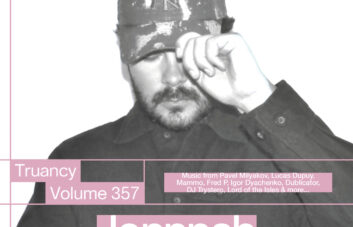“Life hits me hard again” breathes a voice on Malibu’s “Held”, the second track from PAN’s mono no aware. Perhaps it’s sheer coincidence that the label’s ambient compilation arrives at a time of seemingly endless defeat, but with so many hearts hurting in the wake of global upheaval, it’s tempting to conclude that Bill Kouligas and co. are attempting something of a public service through the release of a healing aid.
Speaking via email, Luke Younger – aka HELM – doesn’t write off the possibility. “Perhaps Bill thought that in this particularly stressful political and economic climate we were all due a bit of well-earned ‘chillaxation’,” he says, “and decided to put something together to help the process along.” His own contribution to the mix is “Eliminator”, in which subterranean groans reach us from across a massive distance, whilst an electrified, lo-fi drone slowly circles the listener. Ambient, he says, often provides “an immersive listening experience, and one which removes us from ourselves, pushing life’s trivial woes to the back of our minds. My track is named in reference to this – we eliminate ourselves from life, temporarily.”
Erosion of the self and an elevated sensitivity to the experience of others is certainly a theme over the first half of mono no aware. Tracks are awash with sensations and memories. It opens with Berlin-based Kareem Lofty’s “Fr3sh”, where warbling, bittersweet chords immediately heighten emotions. Malibu’s track follows, in which a broken voice recites near-unintelligible lines over a sullen guitar, as if between sleep and wakefulness. On Yves Tumor’s “Limerence”, stormclouds thunder above an impossibly pretty Roedelius-style loop. We hear grainy film-audio of a woman trying to get a reluctant boyfriend to say something nice for the camera – a barely audible mutter of “I love you too” is all he offers. A sense of loss pervades, as if the footage is being viewed some time after the relationship has ended.
We hear of more loss on Flora Yin-Wong’s contribution “Lugere”, titled after the Latin meaning ‘to mourn’. Harp-like notes and one-time drum hits ring through the track’s layers of voices. “The vocal samples include my own lyrics in Cantonese, and snippets from an old ‘50s song expressing nostalgia for a certain place,” she explains. “There are also kizomba vocals and a voice in Mandarin asking someone not to leave.”
Offerings from Mya Gomez and Bill Kouligas stray into harsher territory but mono no aware is largely not what you’d call a challenging listen. “I don’t think that was the aim of the record,” says Yin-Wong. “It was more an effort to compile tracks from different artists with sounds that are less beat-driven. I think ambient can still be interpreted very narrowly, and restricted to a specific era and sound. But it can be used to simply mean beatless.”
Younger shares similar thoughts on ambient’s scope, pointing out that there’s a long way to travel between something like the Orb and William Basinski. “I think ambient is best thought about like Balearic,” he offers, “in the sense that it’s more about the feeling that the music inspires, rather than being dogged down by musical technicalities. I think that’s part of the reason it has and always will be a hugely popular genre.”
Lars TCF Holdhus suggests that whilst it’s hard to be sure of any overarching agenda for mono no aware, old-school ideas about ambient and its purpose are still relevant. “Beyond taste-making processes and trends, calm music will always serve a utilitarian function,” he asserts. Such was Brian Eno’s thinking when he first had the idea for Ambient 1: Music for Airports. But he’s right to mention trends too; The genre, he thinks, has made something of a comeback, and a quick look at 2016’s end-of-year lists lends weight to this. Releases from Sam Kidel, Julianna Barwick and artists not normally associated with the genre like Huerco S. all scored high.
Holdhus’ contribution is among the more conceptual, with an encrypted title made up of 21 couplets, beginning “C6 81 56…”. Similar to his other works, it contains what he describes as a special, personal message that he’s yet to reveal. Spectrogram tests of previous releases have revealed images of violence from the 2011 protests in Greece. “The track itself is a mix of stochastic modelling and black midi filtered through particular scales,” he explains. The result is a dense bed of random yet harmonious electronic chatter – the sound of an artificial mind firing on all circuits. It’s a puzzling, fascinating addition to a compilation that could prove to become one of PAN’s most-loved releases.
V/A – mono no aware is out now on PAN.



